Vegan Globetrotter is supported by our audience. When you purchase through one of our links, we may earn a small affiliate commission. As an Amazon Associate I earn from qualifying purchases. Your cost is not affected.
==================
Herbs and spices have been used for centuries, not just to enhance the flavor of food but also for their myriad health benefits. From the bustling spice markets of ancient trade routes to modern kitchen pantries, these natural ingredients boast a variety of effects, including anti-inflammatory, antioxidant, and antimicrobial properties. While some spices like turmeric and cinnamon are widely recognized for their medicinal qualities, others are just beginning to gain attention for their health-promoting potential.
Healthy Herbs and Spices: Boosting Wellness Naturally
Throughout history, civilizations have turned to herbs and spices to address a range of ailments and improve overall well-being. Today’s scientific community continues to uncover how these botanicals can contribute to health and nutrition.
Whether it’s the potential for lowering blood sugar levels, supporting heart health, or providing anti-cancer benefits, herbs and spices offer many health advantages with minimal side effects. Incorporating these natural flavorings into one’s diet could be a simple yet effective way to enhance physical health.

Key Takeaways
- Herbs and spices provide significant health benefits, including antioxidant, anti-inflammatory, and antimicrobial effects.
- Scientific research suggests the health-promoting potential of common herbs and spices in managing various health conditions.
- Incorporating a variety of herbs and spices into a balanced diet can contribute to improved overall health.
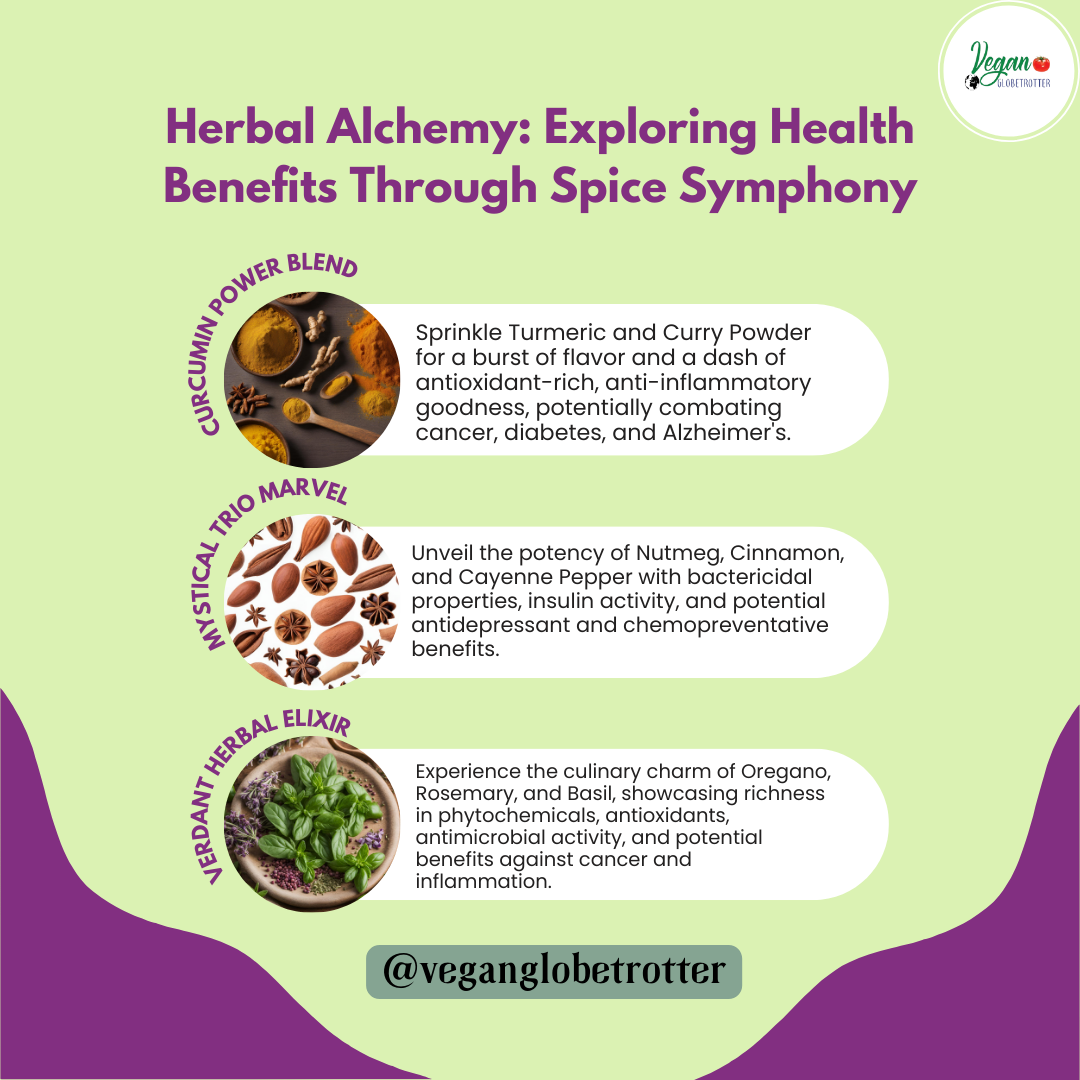
Fundamentals of Healthy Herbs and Spices
Incorporating herbs and spices into one’s diet is integral to maintaining a healthy lifestyle. They provide unique flavors and aromas and offer a range of impressive health benefits due to their nutritional content and active compounds.
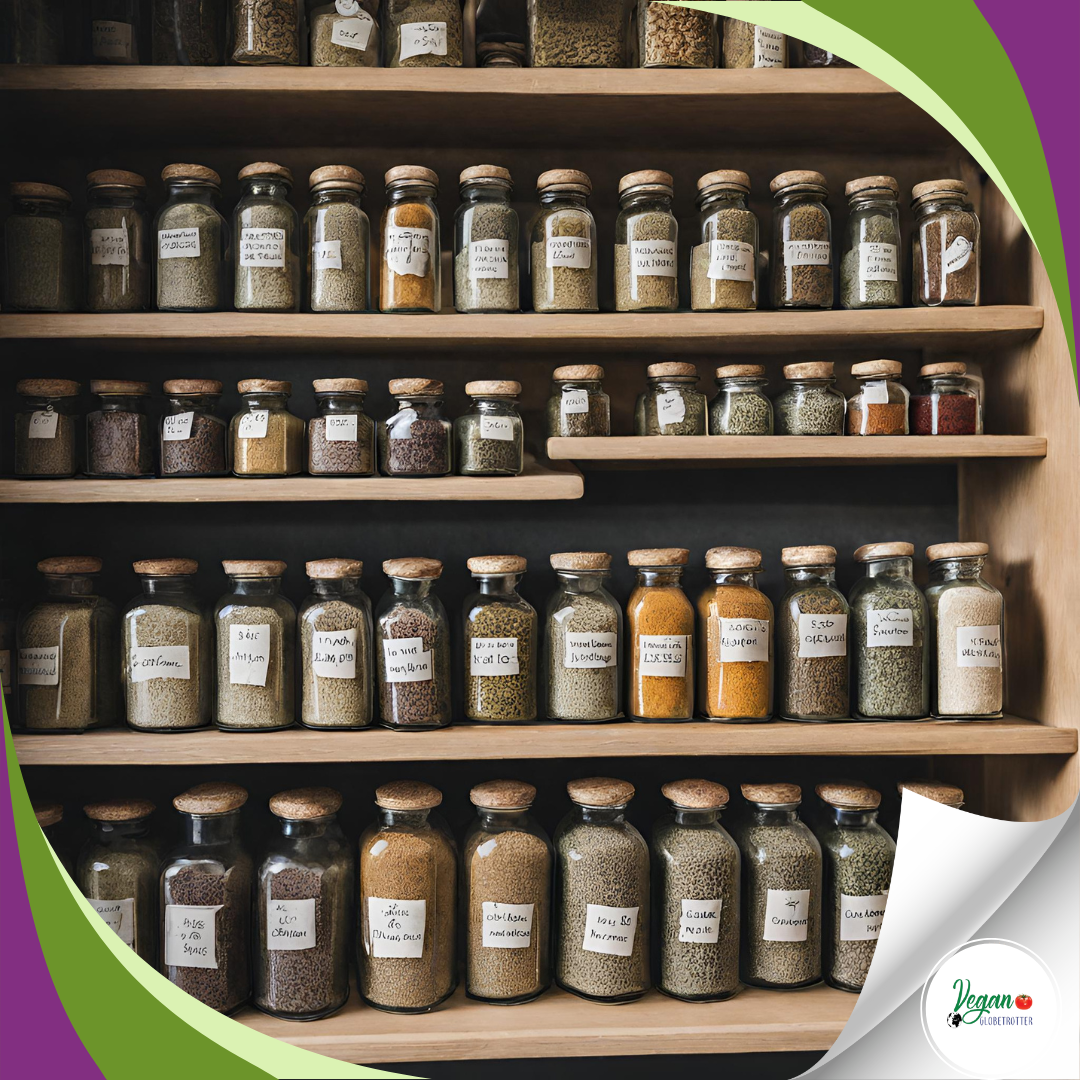
Common Healthy Herbs
- Basil: High in antioxidants.
- Mint: Known for digestive benefits.
- Rosemary: Contains anti-inflammatory properties.
- Thyme: Rich in vitamin C and also serves as an antimicrobial.
Beneficial Spices
- Turmeric: Contains curcumin, a potent anti-inflammatory agent.
- Cinnamon: May help regulate blood sugar levels.
- Ginger: Can alleviate nausea and aid stomach discomfort.
- Cayenne Pepper: High in capsaicin, the cayenne pepper may boost one’s metabolism.
One should be mindful of the quantity and method of integration into meals. Overusing even the healthiest spices can have adverse effects, and certain cooking methods might reduce their health benefits. Freshness is key, as herbs and spices can lose their potency over time.
Proper storage involves keeping them in cool, dry places for maximum efficacy and flavor. Those looking to enhance taste and nutrition can explore organically sourced herbs and spices cultivated without synthetic chemicals.
Ultimately, adding these flavorful elements to a balanced diet can contribute to overall health and well-being, all while enriching the culinary experience.
Popular Herbs and Their Health Benefits
Video Credit: @NaturalHealingGuides
Certain herbs have emerged as nutritional powerhouses in recent years, offering significant health benefits. From reducing inflammation to aiding digestion, these natural remedies are gaining attention for their medicinal qualities.
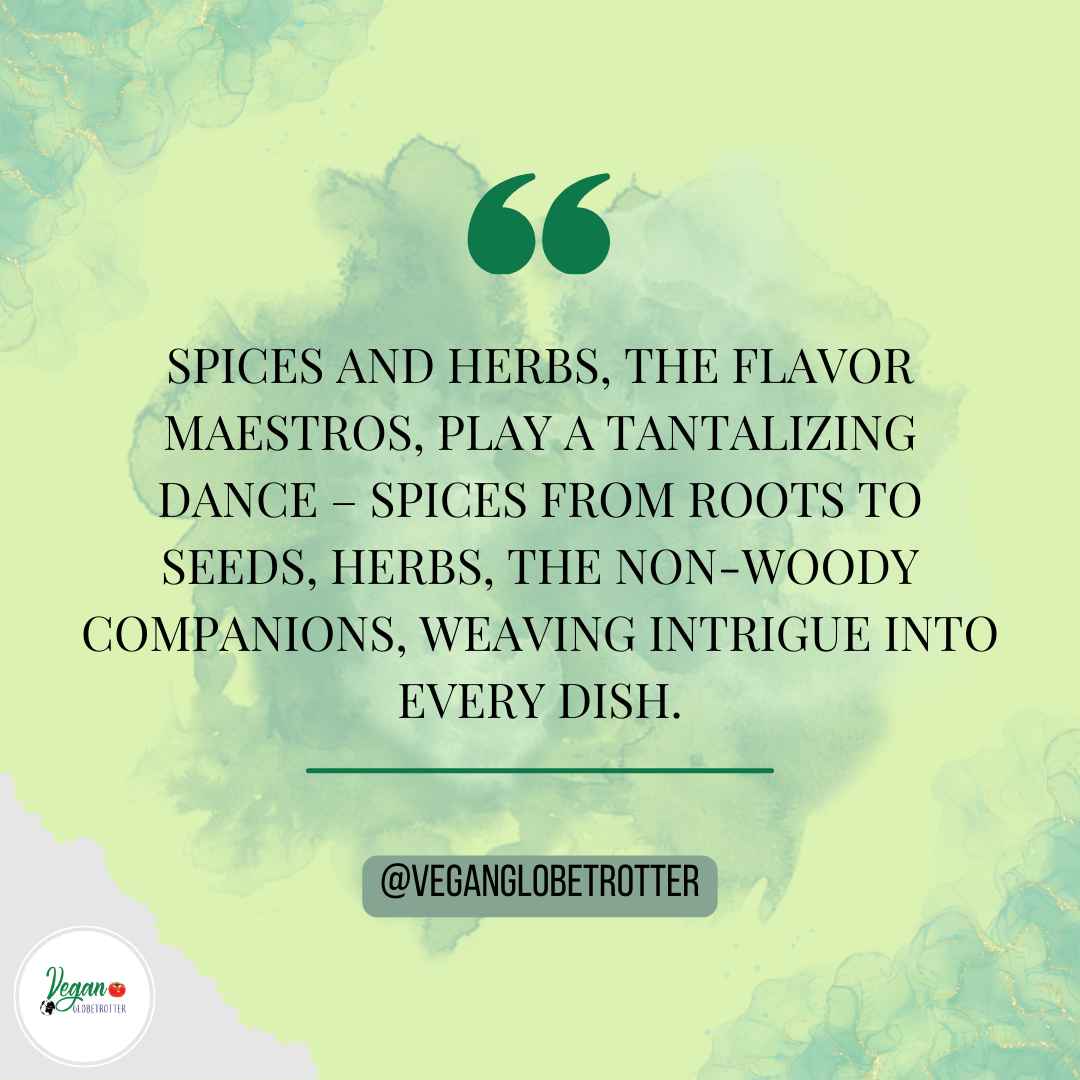
Turmeric
Turmeric is popular for its compound curcumin, which offers potent anti-inflammatory and antioxidant properties. Studies suggest it supports joint health and maintains the body’s immune responses.
Ginger
This versatile root is more than just a kitchen staple. Ginger can soothe nausea and aid digestion. Its bioactive ingredient, gingerol, also carries powerful anti-inflammatory and antioxidant effects.
Basil
Basil isn’t merely a flavorful addition to meals. It’s packed with essential volatile oils that can alleviate stress and boost cognitive function. Moreover, basil has antimicrobial properties that can contribute to fighting infections.
Beneficial Spices and Their Effects
Video Credit: @HorizonsHealth
Certain spices boast specific health benefits that can contribute to a balanced diet and aid in disease prevention.
Cinnamon
Cinnamon is more than a warming, sweet flavor for desserts and drinks. It contains cinnamaldehyde, its active component, which can reduce blood sugar levels and has anti-inflammatory properties.
Black Pepper
Black Pepper might be a staple on dining tables, but it also carries health contributions. The compound piperine, which gives black pepper its pungency, can enhance nutrient absorption, particularly selenium, vitamin B12, and beta-carotene, and may have cancer risk-reducing properties.
Garlic Powder
Garlic Powder offers many benefits of fresh garlic, such as immune-boosting effects, without the hassle of peeling and chopping. It’s rich in compounds like allicin, which has the ability to lower cholesterol and high blood pressure levels, contributing to overall heart health.
Incorporating Herbs and Spices into Your Diet
Video Credit: @PhysiciansCommittee
Incorporating health herbs and spices into one’s diet is a gateway to enriching flavors and brings various health benefits. One can easily begin with familiar items such as black peppercorns, which can reduce cancer risk potentially.
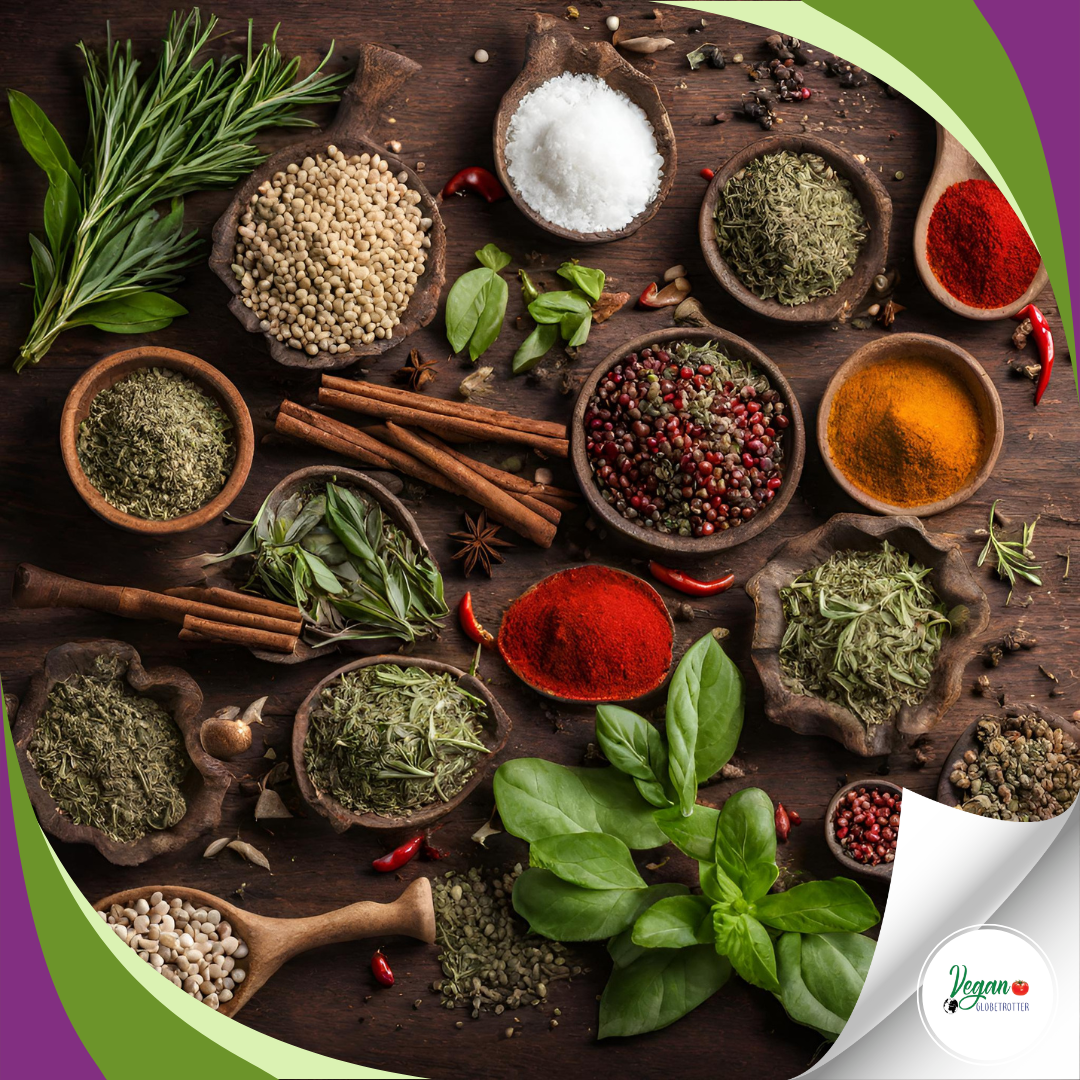
Starting Small
- Use Freshly Ground Spices: For a more intense flavor, they should grind their spices before use.
- Herbs as Garnish: They can add fresh parsley, cilantro, or basil for a vibrant finish to dishes.
- Spice Blends: Explore homemade or quality store-bought spice blends for a quick flavor boost.
In Cooking
- Use herbs like rosemary and thyme in roasts to create aromatic dishes.
- Incorporate turmeric, recognized for its anti-inflammatory properties, into curries and soups.
- Add cinnamon to sweet and savory recipes for warmth and potential blood sugar regulation.
Quantity and Balance
- Individuals should consider pairing spices and food to enhance the natural flavors without overwhelming them.
- One can start with smaller amounts, gradually increasing to suit one’s taste preferences.
A Practical Approach
- Mix dried herbs into marinades and dressings.
- They might sprinkle ground spices on top of lattes or oatmeal.
- Adding small, chopped garlic and onions into dishes can considerably add taste and nutritional value.
By integrating a variety of herbs and spices into their meals, individuals not only make their food more exciting and delicious but may also receive the added benefit of a nutritional boost.
Herbal Remedies for Common Ailments
Video Credit: @Permacrafters
Incorporating herbs into one’s daily routine can relieve and support various common health issues. Herbal remedies have been used traditionally and are supported by modern research to aid digestion, improve sleep, and bolster the immune system.
Peppermint for Digestion
Peppermint is renowned for its ability to soothe digestive ailments. It works by relaxing the digestive system muscles, relieving symptoms of indigestion and nausea. Studies have shown that peppermint oil can effectively reduce pain and bloating for individuals with IBS.
Chamomile for Sleep
Chamomile, a gentle and calming herb, is frequently used to promote relaxation and improve sleep quality. The plant contains antioxidants, which are thought to play a role in inducing sleepiness and reducing insomnia. Sipping a cup of chamomile tea before bedtime can help prepare the body for a restful night.
Echinacea for Immune Support
Echinacea is a popular herb for strengthening the immune system, and it is often utilized at the onset of cold symptoms. Components in Echinacea have been found to increase the body’s number of white blood cells, which fight infections. The potential benefits of Echinacea extend to its anti-inflammatory properties, contributing to its role in immune health.
Safety Considerations and Usage Guidelines
Video Credit: @achstv
When incorporating herbs and spices into cooking, safety is paramount. Individuals should ensure that they are using fresh, high-quality products.
Herbs and spices can become contaminated with pathogens or other harmful substances. As highlighted by the FDA, it is crucial to address spice safety to reduce foodborne illness risks.
Consumers should store herbs and spices in a dry, cool environment to maintain their quality and safety. Proper storage extends their shelf life and helps preserve their flavors. It is recommended to follow the FDA’s guidance on food safety, including routine safety awareness training for everyone handling culinary herbs.
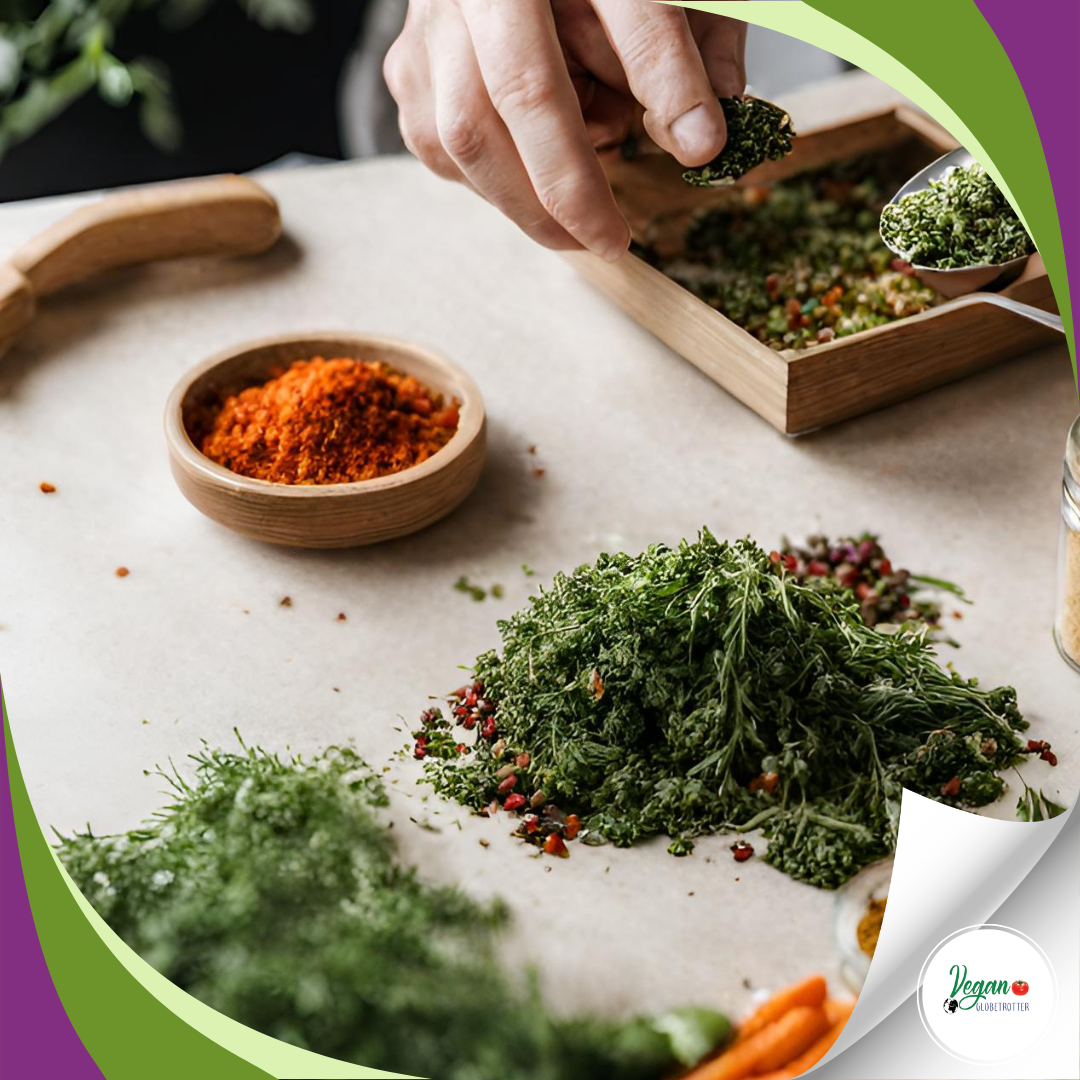
Usage Guidelines
- Dosage: Begin with small quantities to gauge reaction and flavor impact.
- Allergies: Be aware of any personal or family food allergies.
- Pregnancy: Some herbs should be avoided during pregnancy. Consult a registered dietitian or other health care providers.
- Medicinal Interactions: Some spices can interfere with medications. Seek advice from a health care professional before using them as health aids.
- Source Verification: Purchase from reputable suppliers with transparent safety standards.
Storage Tips
Always remember that fresh culinary herbs require careful handling to maintain their safety, and other spices and seasonings require oversight to ensure they do not carry contaminants.
Cultivating and Harvesting Your Own Herbs
Video Credit: @foodwishes
Growing herbs can be both pleasurable and beneficial. They require little space and can be grown indoors or outside. Starting your herb garden is simple: choose a sunny spot, use pots with good drainage to prevent root rot, and soil suited for herb growth.
Annual vs. Perennial Herbs
- Annuals: basil, dill, cilantro
- Perennials: thyme, sage, rosemary
Ideal Conditions
- Soil: Rich, well-drained
- Watering: As needed, avoid overwatering
- Light: At least 6 hours of sunlight
- Temperature: 60°F to 70°F for indoors
When it comes to harvesting herbs, timing is crucial. One should harvest in the morning after the dew has evaporated but before the sun is at its peak. This ensures the herbs retain their essential oils, providing maximum flavor and fragrance.
For continuous growth, one should harvest herbs by snipping the top leaves. This encourages branching and leads to fuller plants.
Herb Harvesting Tip
Basil: Snip the topmost leaves just above a pair of growing leaves.
Thyme: Cut the tops of the stems before the plant flowers.
Cilantro: Harvest by cutting the outer leaves, allowing the center to regrow.
By adhering to optimal harvesting practices, which essentially act as pruning, gardeners can enjoy an ongoing supply of fresh herbs. For more information, gardeners may refer to the guidelines about how to harvest herbs and keep them growing.
The Future of Herbs and Spices in Wellness
The world of health and wellness constantly evolves. So does the role of herbs and spices within it. This section explores what the future holds. We look at emerging trends and scientific research. Let’s dive in.
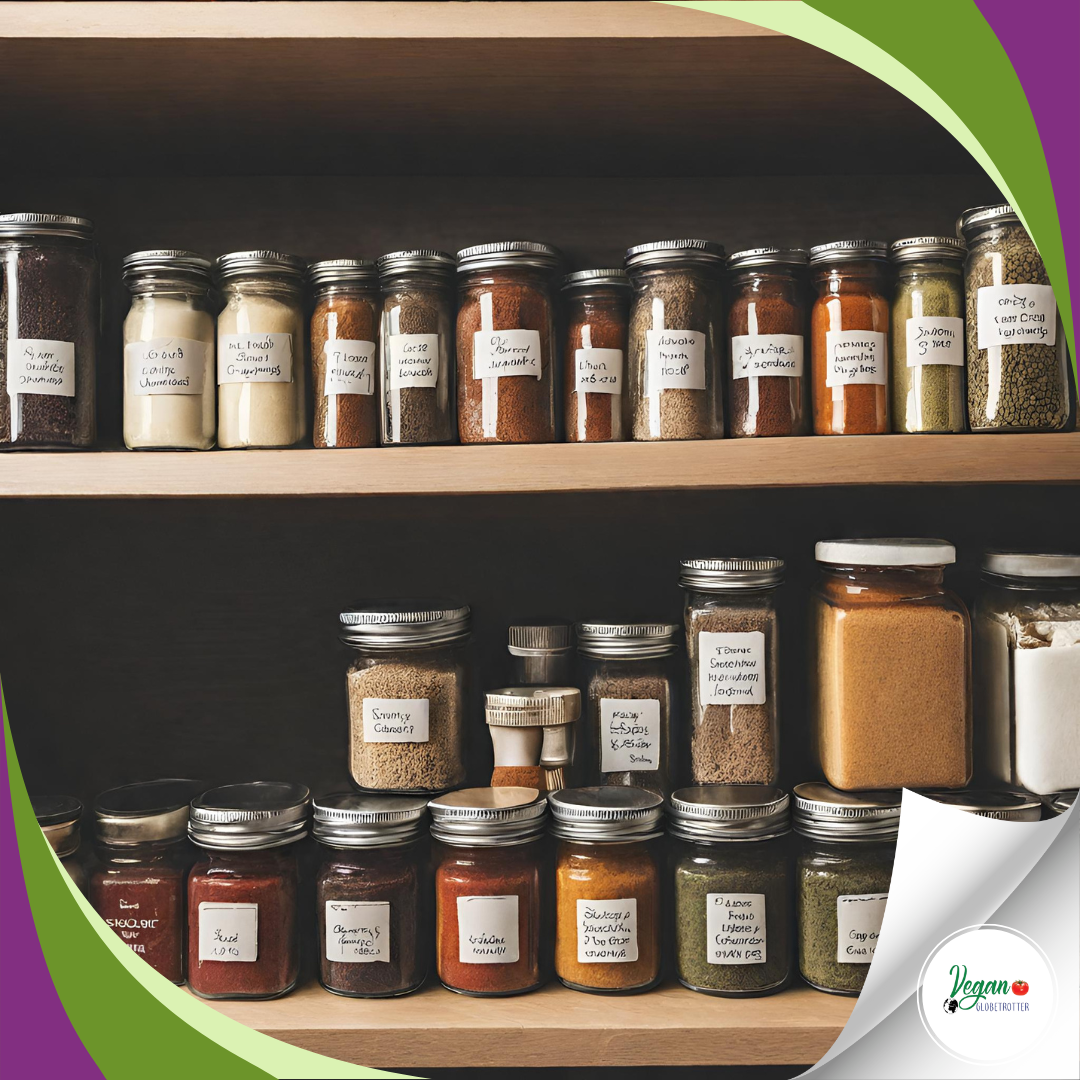
Precision Nutrition
Personalized health is the future. Precision nutrition considers individual differences. Genetics and lifestyle play a part.
Herbs and spices will be tailored to fit personal health goals and needs. Imagine custom blends designed just for you.
Technological Advances in Extraction
Science is getting better at extracting benefits from herbs and spices. New methods mean more potent supplements.
This could enhance their effectiveness. It also ensures you get more of the good stuff, with less.
Sustainability Takes Center Stage
As demand grows, so does the focus on sustainability. Consumers want ethically sourced products. They care about the planet.
The industry is listening. Expect more transparency and eco-friendly practices in how herbs and spices are grown and harvested.
Broader Acceptance in Medical Communities
Doctors and health professionals are embracing natural remedies more. This includes herbs and spices.
As research grows, so does their integration into conventional medicine. This partnership could revolutionize how we approach health and wellness.
Education and Accessibility
Knowledge is power. More resources will become available.
They will teach us about the benefits and uses of herbs and spices. With increased accessibility, everyone can incorporate these natural wonders into their wellness routine.
The future looks bright for herbs and spices in health and wellness. As we learn more, we can expect them to play an even bigger role in our lives.
Their potential is vast. The journey to discovering all they have to offer is just beginning.
Wrapping It Up
Herbs and spices are natural wellness boosters. They add flavor and health benefits to your meals. Incorporate them into your diet for added nutrition.
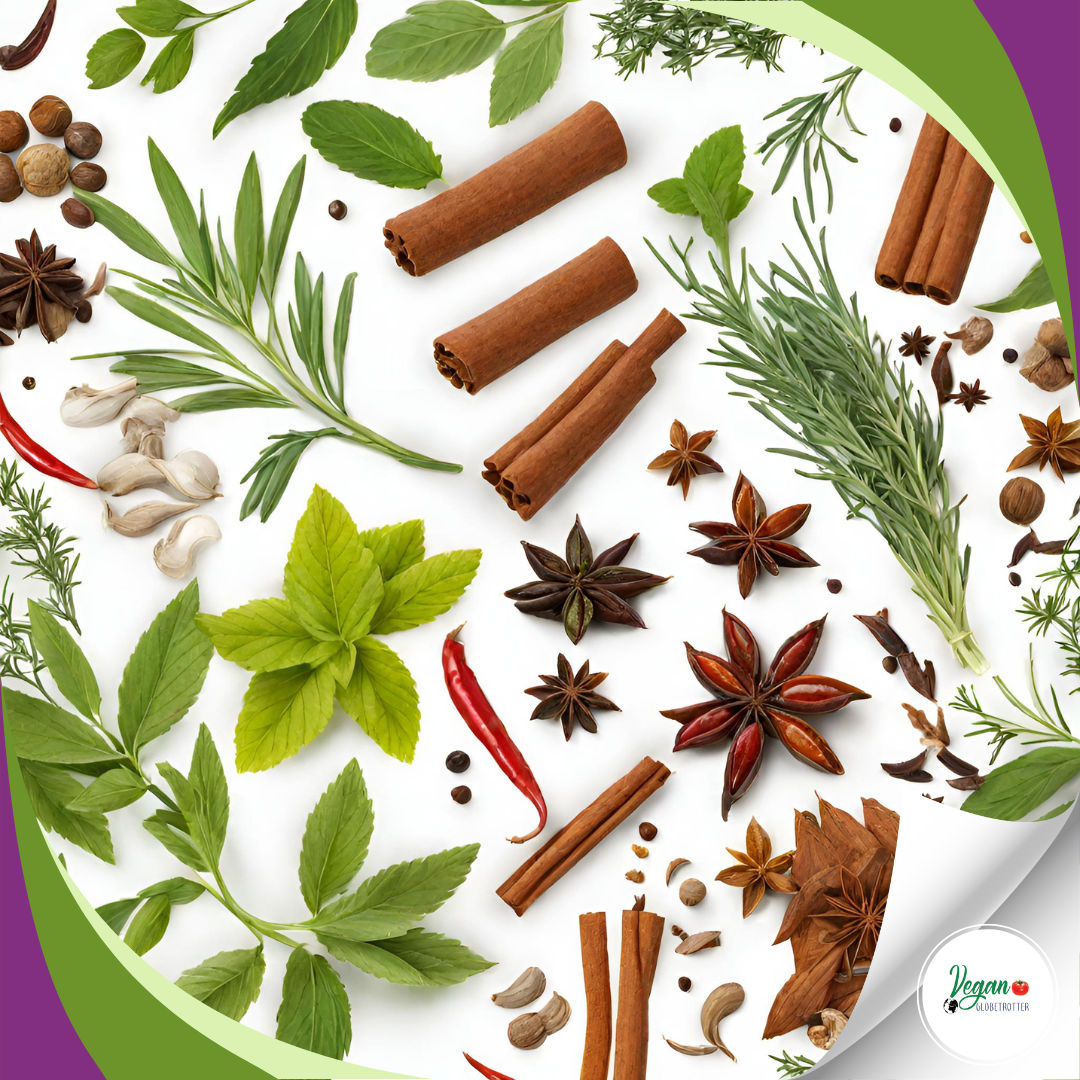
Remember, a sprinkle of herbs or spices can make a big difference in your health. Explore their variety and enjoy the natural boost to your wellness!
Frequently Asked Questions
What are the top herbs known for their medicinal properties?
Herbs like peppermint and echinacea are famous for their healing properties. Peppermint is often used for its digestive benefits, while echinacea is popular for immune support.
Which spices have been proven to offer significant health benefits?
Spices such as turmeric and cinnamon are popular for their health-promoting qualities. Turmeric contains curcumin, which has anti-inflammatory effects, and cinnamon is known to control blood sugar levels.
Which herbs do you recommend for daily consumption to promote health?
Incorporating herbs like parsley and oregano into one’s daily diet can contribute to health. Parsley is a rich source of vitamins and flavonoids, while oregano is full of antioxidants.
What is the most potent herb for improving overall well-being?
Although many herbs have health-boosting effects, ginseng is often cited as a potent herb for enhancing well-being because it supports vitality and reduces stress.
Are there any spices that are detrimental to health?
While most spices offer numerous health benefits, excessive spice consumption can lead to adverse effects. For instance, an excess intake of nutmeg can cause toxicity.
How do herbs and spices contribute to healing and health maintenance?
Herbs and spices contain a variety of phytochemicals and nutrients that support healing and health. They play a role in anti-inflammatory and antioxidant activity, which can prevent and alleviate various health conditions.
Learn Vegan Cooking With Us!
Discover the various vegan dishes with Vegan Globetrotter. Learn aromatic and appetizing vegan dishes that blend flavor, health, and simplicity. Stay connected and enhance your vegan cooking skills:
- Facebook: Vegan Globetrotter
- Instagram: @_veganglobetrotter
- Pinterest: The Vegan Globetrotter
- Twitter: @VeganGlobetrot
Join our community and explore the wonders of vegan cooking! For more insights into the world of vegan cooking, visit our website: veganglobetrotter.com

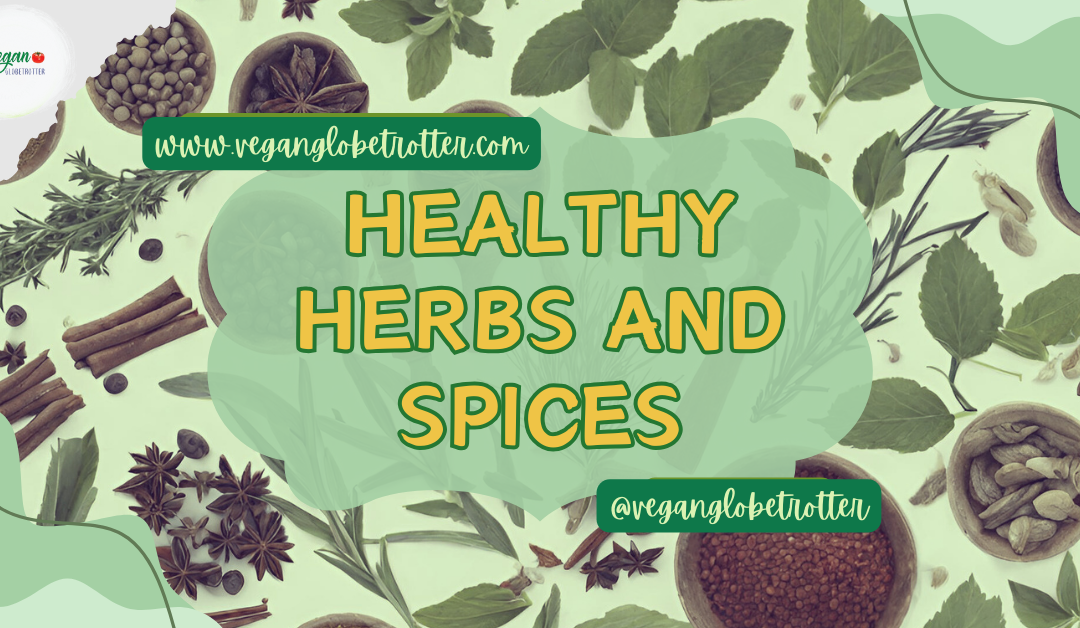

Don't miss out
when new recipes and information are added!
Join our newsletter for free recipes,
healthy living inspiration, and special offers
You have Successfully Subscribed!